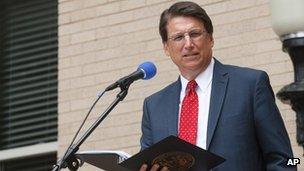North Carolina Governor Pat McCrory signs voter ID law
- Published

Gov McCrory said photo identification was required for common practices such as boarding a plane
North Carolina Governor Pat McCrory has signed into law a controversial bill requiring voters to show photo IDs when they go to the polls.
His state becomes the first in the US to impose restrictions on voters since the Supreme Court struck down part of the 1965 Voting Rights Act in June.
Civil liberties groups immediately challenged the decision, arguing it hit minorities and poorer voters hardest.
But supporters of the law say it tackles voting fraud.
'Protection'
The Voting Rights Act was originally enacted to fight entrenched racial discrimination against voters in the 1960s.
But the Supreme Court ruled, external in June that circumstances had since changed and key elements of the Act were intended to be only temporary.
In effect, the ruling brought an end to the requirement for federal "pre-clearance" of changes to election laws in 15 mainly Southern states.
Gov McCrory, who is a Republican, said in a statement, external: "Common practices like boarding an airplane and purchasing Sudafed require photo ID and we should expect nothing less for the protection of our right to vote."
The North Carolina law, as well as requiring voter identification, bans election-day registration and reduces the period allowed for early voting from 17 days to 10. College and university photo IDs will not be considered legitimate identification.
The American Civil Liberties Union (ACLU) and other groups immediately filed a lawsuit challenging the changes, due to come into effect in 2016.
"Eliminating a huge part of early voting will cut off voting opportunities for hundreds of thousands of citizens," ACLU official Dale Ho told North Carolina media.
Former Secretary of State Hillary Clinton, in a speech in San Francisco on Monday, criticised the court's ruling, arguing that "anyone who says racial discrimination is no longer a problem in American elections must not be paying attention".
Texas passed its own voter ID law in 2011 and US Attorney General Eric Holder said last month he would challenge the legislation, describing the Supreme Court's June ruling "flawed".
- Published25 June 2013
- Published1 October 2012